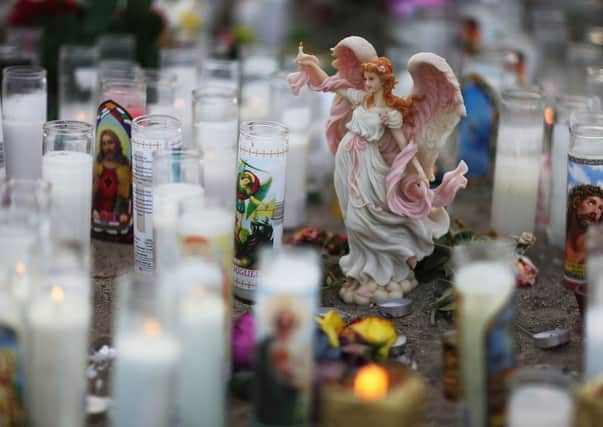Leaders: Threat of terror on UK soil all too real


IN the aftermath of the terrorist murders of 14 people in San Bernardino, California, the USA’s secretary of homeland security Jeh Johnson said the attacks marked a new phase in the global terrorist threat.
Mr Johnson said terrorists had effectively “outsourced” attempts to attack America. His warning applies across the world.
Advertisement
Hide AdAdvertisement
Hide AdIslamist attacks in the name of Islamic State (IS) do not necessarily have to be ordered by the organisation’s high command.
Instead, it is becoming apparent that cells or individuals are perfectly capable of planning mass murders under their own initiative, without any direct connection, training or resources from a central body.
In the case of the San Bernardino attacks, the perpetrators had been regarded an an ordinary couple. There was no reason for security services to pay them any attention.
In order for there to be pre-emptive action against Islamist terrorism there must first be a pattern of behaviour that alerts authorities, trips to Isis controlled areas of Iraq or Syria, perhaps, or involvement with radical groups at home.
But what if those who decide to kill in the name of the creation of a global caliphate leave no trace as they plan their atrocities? How might they be identified and stopped?
In the USA, the immediate response will be a tightening of borders and yet another protracted and probably futile debate on gun laws.
Here in the UK, we require our own response to the changing nature of terrorist attacks.
On Saturday evening, a lone knifeman attacked commuters at Leytonstone tube station in east London. Witnesses report that the man – now detained by police – shouted “this is for Syria” as he stabbed and threatened people inside the station. We do not yet know a great deal about the arrested man but should he turn out to have been inspired by IS then Mr Johnson’s warning should ring doubly true in the UK.
Advertisement
Hide AdAdvertisement
Hide AdThe UK and its citizens are considered prime targets by Islamists.
We have suffered serious attacks in recent years and politicians across the spectrum have made clear that they consider further outrages to be inevitable.
Identifying “lone wolf” operators will, we believe, require a further debate on the powers security services have to monitor phone and internet use.
There are compelling arguments against weakening the rights to privacy and free speech but we must accept that if we hold dear to these principles, we may be making it more difficult for attackers to be discovered and stopped.
The UK is currently – as part of an international coalition – carrying out airstrikes on IS territory in Syria.
Some insist that the action will make the likelihood of a terrorist attack even greater.
We suspect those willing to kill in the name of IS did not require that action to have taken place in order to forge their hatred of the UK.
The threat of further Islamist terror attacks on UK soil is all too real.
Advertisement
Hide AdAdvertisement
Hide AdOur security services must have the resources to fight back. And they must get a fair hearing if they ask for greater surveillance powers.
Bridge closure poses challenge
IF ever we needed evidence of the fragility of Scotland’s transport network, the closure of the Forth Road Bridge until next year provides it in spades.
The action – taken after the discovery of flaws in the structure – led immediately to traffic chaos. And in the days since, Edinburgh has been all but unreachable for a great many commuters from Fife and beyond.
Of course, safety is paramount and the closure of the bridge must be tholed. But there is no escaping the reality that the road network will be stretched to breaking point as we move towards the Christmas peak.
Yesterday, transport minister Derek Mackay admitted that ministers simply do not know whether Scotland’s roads will cope with the closure of the bridge, a crucial part of the east coast network. The Scottish Government has asked members of the public to consider working for home if at all possible and urged those who must commute to car share or use public transport. Mr Mackay did not appear confident yesterday that people, in sufficient numbers, would heed this advice.
The closure of the bridge does not, of course, simply mean inconvenience for commuters. It has huge implications for businesses, with both deliveries and the maintenance of services made more difficult.
It is time for some creative thinking on the part of ministers. If the road network faces intolerable pressure, perhaps ministers might consider subsidising public transport for those who have to travel between Edinburgh and Fife.
These are desperate times and the Scottish Government, councils and other public
bodies must do all they can to ease pressure on the roads, otherwise the economy risks grinding to a halt.